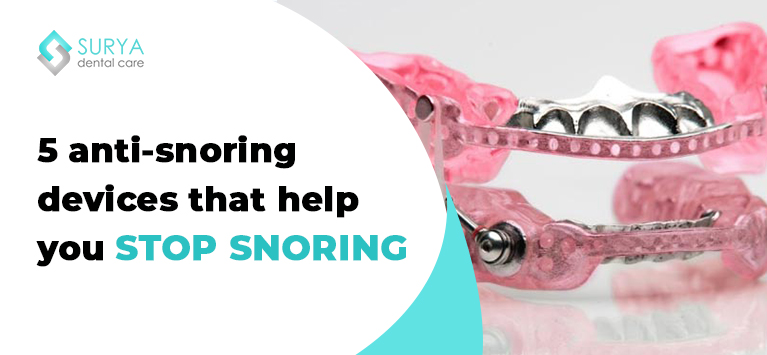
Sleep should never be a noisy activity. If you believe snoring is a sign of restful sleep, you are wrong. The hoarse sound indicates that something is interfering with your breathing patterns and you should seek medical attention.
When there is an obstruction or collapse in the upper airway, the airflow in the upper airway tract causes tissues in the throat to vibrate. Such disturbances in the uvula (a fleshy part that hangs down at the back of your throat) produce a sound and it is called snoring.
Snoring is not a normal thing even though it is considered a common dental concern. Luckily, you have a variety of oral appliances to treat snoring. They are called anti-snoring devices (or) snore stoppers. Continue reading to learn about the different snoring stopper appliances that sleep dentists recommend.
How do anti-snore devices alleviate snoring?
As discussed earlier, snoring is the sound produced by the continuous resistance in the upper airway. Various attributes like narrow nasal passages, elongated uvula, enlarged soft tissues in the throat, and nasal problems contribute to this.
Once you wear or insert the appliance inside your mouth, it brings the jaw forward and opens the upper airway. Thus the turbulence in the air tract is reduced to alleviate snoring.
What are the different types of snore stoppers available?
In general, dentists recommend snore stopper devices if they detect any anomaly in the anatomy of your mouth and sinus. Each appliance works in their unique way. After identifying the underlying reason for snoring, your dentist will recommend the best one for you.
1) Mandibular Advancement Device (MAD)
Mandibular Advancement Device is the widely recommended appliance to stop snoring. It looks like a sports mouthguard and gently pushes the lower jaw down and forward slightly. Hence a space in the pharynx is made to reduce blockage and turbulence in those regions.
This action separates the vibrating elements in the throat, preventing snoring. It can be customized to fit inside your mouth.
Although the MADs are adjustable and effective, they cause some sort of tooth discomfort. It is powerful to trigger teeth shifting as well so dentists do not recommend it for people with dental discomforts.
2) Tongue Retaining Devices
If sleep dentists discover that snoring is caused by the tongue, they will propose a tongue stabilization device. It tends to isolate and draw pull the tongue forward, creating a gap between the tongue and the end of the throat. As a consequence, the resistance in the airway tract is removed, and snoring can be greatly reduced.
Despite its effectiveness and other features like easy to wear, and easily customizable, it makes the wearers feel mild distress on their tongue. This is the right snore stopper device for persons who have missing teeth.
3) Continuous Positive Airway Pressure (CPAP) Device
This is the widely recommended device to treat obstructive sleep apnea. It aims at keeping the airway tract open by providing continuous airflow into the throat through the nose.
The CPAP devices involve a motor, mask, and a tube that connects both. The snorer has to wear the mask connected to the motor. The motor pumps air under pressure into the airways of the lungs hence that the airway collapse and its aftereffects like snoring are reduced.
4) Snoring Chin Straps
The efficacy of the chin straps is not established in many research papers hence that this device is generally prescribed for light snorers. It is a type of adhesive tape that must be applied under the chin to keep the mouth closed.
The chin straps do not cause any pain and are widely recommended for people who wear dentures or dental braces.
5) Vestibular Shield
If mouth breathing triggers you to snore, the Vestibular shield will be the right choice for you. Similar to other snoring mouth guards discussed earlier, it can be placed inside the mouth. It enforces the mouth to keep closed and makes the body breathe through the nose while sleeping.
Bottom line
A deep & restful sleep involves the sound of inhales and exhales alone. The harsh sound indicates arrhythmic breaths that should require immediate attention. The anti-snoring devices discussed here are recommended to treat snoring triggered by mild to moderate sleep apnea and atypical anatomy of the mouth.
However, allergies, alcohol consumption, sleep position, nasal or sinus disorders, and other variables can all contribute to snoring. Snoring treatment options will vary in such circumstances.



